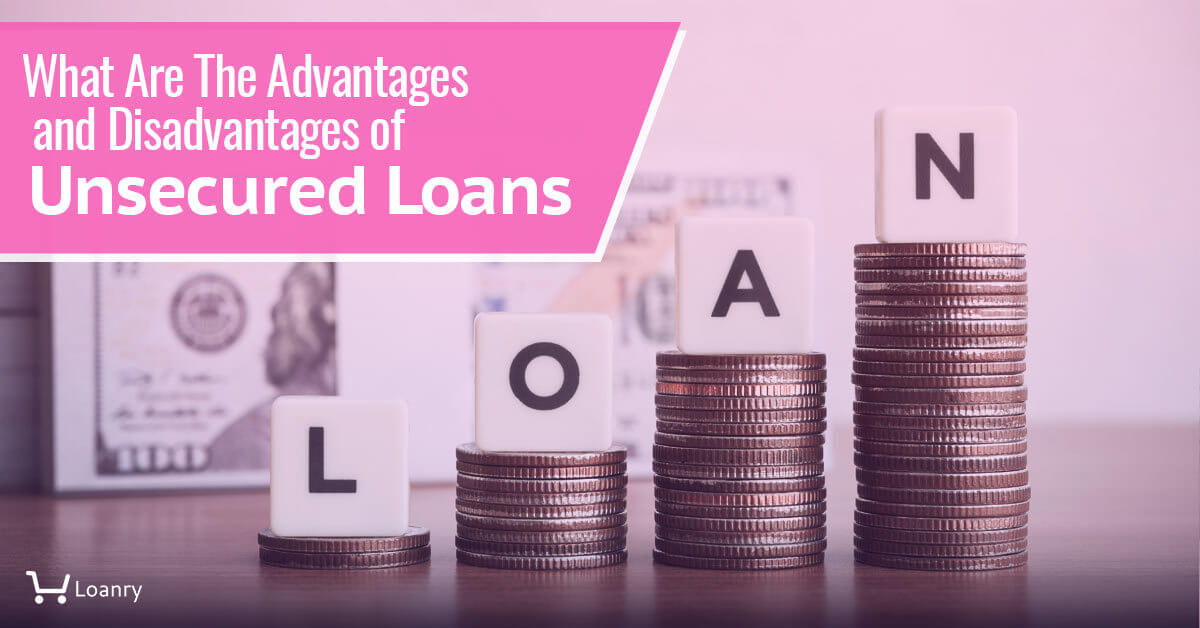We are an independent, advertising-supported comparison service. Our goal is to help you make smarter financial decisions by providing you with interactive tools and financial calculators, publishing original and objective content, by enabling you to conduct research and compare information for free – so that you can make financial decisions with confidence.
Bankrate has partnerships with issuers including, but not limited to, American Express, Bank of America, Capital One, Chase, Citi and Discover.
Unsecured loans are increasingly popular financial tools for handling life’s expenses. Unlike their secured counterparts which require collateral, unsecured loans offer more flexibility and simplicity. However, they also come with some drawbacks like higher interest rates. By understanding the key advantages and disadvantages, you can determine if an unsecured loan is the right choice for your situation.
What Are Unsecured Loans?
An unsecured loan is one issued without any collateral or security deposits from the borrower. The loan is not tied to any personal assets like a house, car, or investment account. The lender provides funds solely based on the borrower’s creditworthiness.
Common types of unsecured loans include:
- Personal loans
- Credit cards
- Payday loans
- Student loans
- Medical loans
These loans provide access to capital that can be used for almost any purpose. You have the freedom to use the money for pressing needs like medical bills, home repairs, debt consolidation, or other major expenses.
The Main Benefits of Unsecured Loans
While unsecured loans come with higher interest rates, they provide other advantages that make them an attractive option for many borrowers. Here are some of the top benefits.
No Risk to Personal Property
With a secured loan, the lender can seize your home, car, or other assets if you default on the debt This gives the lender recourse if you cannot make the loan payments
Unsecured loans do not put your property at risk. There is no collateral involved, so the lender cannot take possessions like your home or vehicle if you fail to repay the loan. This gives you more protection, especially if you run into temporary financial hardship.
The Application Process Is Simpler
Secured loans require lengthy applications because the lender must evaluate the collateral being used to back the loan. This involves property appraisals, title checks, and other documentation.
The application process is much simpler for unsecured loans. Lenders mainly check your credit score and history to assess your ability to repay the borrowed amount. The streamlined underwriting leads to quicker loan decisions.
Access to Smaller Loan Amounts
Many secured loans have minimum loan amounts in the tens of thousands of dollars. This makes them impractical for covering smaller yet pressing expenses.
Unsecured loans allow you to borrow smaller amounts like $1,000 to $5,000. This flexibility makes them useful for taking care of sudden costs like emergency car repairs or replacing a broken appliance.
Flexible Usage of Funds
With most secured loans, you must use the money for predefined purposes like buying a home or vehicle. The lender will check that you use the funds appropriately.
Unsecured loans offer flexibility in how you use the money. Once approved, the lender provides the funds directly to you without restrictions. You can use unsecured loans for almost any legal purpose.
Revolving Credit Lines Available
Credit cards are one of the most common types of unsecured loans. They provide revolving credit lines that you can draw upon as needed. You can carry balances from month to month, paying interest only on the current outstanding amount.
This reusable credit comes in handy when you have fluctuating expenses throughout the year. You can avoid taking out new loans each time an expense pops up.
Factors to Consider Before Getting an Unsecured Loan
While unsecured loans present useful benefits, they also come with risks to weigh before borrowing.
Higher Interest Rates
Unsecured loans almost always carry higher interest rates than secured alternatives. Without collateral, lenders face a greater risk of borrowers defaulting. They compensate by charging higher rates.
Carefully compare interest rates across lenders to find the best deal. Even a couple percentage points can equal huge savings over the loan repayment period.
Require Strong Credit
Given the lack of collateral, unsecured loan lenders thoroughly vet applicants based on their creditworthiness. They favor borrowers with high credit scores indicating a solid history of managing debt responsibly.
Those with poor credit often cannot qualify for an unsecured loan or will pay very high rates if approved. Boost your score before applying to increase approval chances and lower the rate.
Missed Payments Hurt Credit
Any missed or late payments on an unsecured loan will directly damage your credit standing with the lender. With secured loans, lenders can tap into your collateral before reporting delinquencies.
Stay diligent about making your unsecured loan payments on time to avoid credit score impacts. Set up autopay or reminders to reduce the risk of accidentally missing payments.
Potential for Lawsuits and Garnished Wages
Lenders have little recourse with unsecured loans beyond hurting your credit score. However, they can take more aggressive collection measures like suing borrowers or garnishing wages.
These legal actions can financially devastate borrowers already struggling with payments. Some unscrupulous lenders may immediately pursue lawsuits, even if you only miss a single payment.
Higher Chance of Loan Denial
Meeting unsecured loan requirements depends solely on your creditworthiness. Many borrowers get denied because of less-than-ideal credit scores or debt levels. With secured loans, you can still qualify by putting up assets as collateral.
Before applying, check your credit report and score. Then apply with lenders most likely to approve your profile to avoid unnecessary credit checks that further lower your score.
Tips for Getting the Best Unsecured Loan Terms
While unsecured loans pose some risks, you can get affordable rates and reasonable terms by following smart borrowing practices:
-
Shop around – Compare interest rates across multiple lenders and lending platforms. Even small rate differences can save big over time.
-
Improve your credit – Work on increasing your credit score before applying. Higher scores unlock better loan terms.
-
Consider a co-signer – Adding a creditworthy co-signer with a high score can help you qualify and get lower interest on an unsecured loan.
-
Examine the fees – Look beyond just rates. Lender fees can greatly impact the overall cost. Opt for no or low origination fees when possible.
-
Set up autopay – Lenders may lower rates if you enroll in autopay to ensure on-time payments. Just be sure you have the funds in your connected account.
-
Take the shortest term possible – Shorter loan terms often have lower rates. Pay more each month to repay the balance quicker and pay less interest.
-
Watch for prepayment penalties – Some lenders charge you extra fees for paying off an unsecured loan early. Avoid these if possible.
Unsecured Loans Offer Useful Flexibility
While riskier for lenders, unsecured loans provide borrowers with agility in accessing and using funds. You avoid tying up personal assets as collateral. The streamlined application also allows faster access to cash for pressing financial needs.
However, the lack of collateral leads to stricter approval requirements and higher rates. Weigh the pros and cons carefully before obtaining an unsecured loan. Make sure to shop around and only borrow what you can feasibly repay to get the best experience. With the right discipline, unsecured loans offer helpful financial solutions without putting your property at risk.

How We Make Money
The offers that appear on this site are from companies that compensate us. This compensation may impact how and where products appear on this site, including, for example, the order in which they may appear within the listing categories, except where prohibited by law for our mortgage, home equity and other home lending products. But this compensation does not influence the information we publish, or the reviews that you see on this site. We do not include the universe of companies or financial offers that may be available to you.

At Bankrate we strive to help you make smarter financial decisions. While we adhere to strict , this post may contain references to products from our partners. Heres an explanation for . Bankrate logo
Founded in 1976, Bankrate has a long track record of helping people make smart financial choices. We’ve maintained this reputation for over four decades by demystifying the financial decision-making process and giving people confidence in which actions to take next.
Bankrate follows a strict editorial policy, so you can trust that we’re putting your interests first. All of our content is authored by highly qualified professionals and edited by subject matter experts, who ensure everything we publish is objective, accurate and trustworthy.
Our loans reporters and editors focus on the points consumers care about most — the different types of lending options, the best rates, the best lenders, how to pay off debt and more — so you can feel confident when investing your money. Bankrate logo
Bankrate follows a strict editorial policy, so you can trust that we’re putting your interests first. Our award-winning editors and reporters create honest and accurate content to help you make the right financial decisions.
We value your trust. Our mission is to provide readers with accurate and unbiased information, and we have editorial standards in place to ensure that happens. Our editors and reporters thoroughly fact-check editorial content to ensure the information you’re reading is accurate. We maintain a firewall between our advertisers and our editorial team. Our editorial team does not receive direct compensation from our advertisers.
Bankrate’s editorial team writes on behalf of YOU – the reader. Our goal is to give you the best advice to help you make smart personal finance decisions. We follow strict guidelines to ensure that our editorial content is not influenced by advertisers. Our editorial team receives no direct compensation from advertisers, and our content is thoroughly fact-checked to ensure accuracy. So, whether you’re reading an article or a review, you can trust that you’re getting credible and dependable information. Bankrate logo
Pros and cons of secured loans
- Less stringent eligibility requirements.
- Often feature lower interest rates than unsecured loans.
- Higher borrowing limits than unsecured loans.
- Collateral can be taken if you default on the loan.
- Failure to repay the loan as agreed can damage your credit.
- There tend to be restrictions on how you can use the funds.
Secured vs Unsecured Loan
FAQ
What are the advantages and disadvantages of unsecured loans?
|
Type of Loan
|
Advantages
|
Disadvantages
|
|
Unsecured Loans
|
Shorter repayment terms
|
Lower loan amounts available
|
|
|
Faster application process
|
Higher interest rates
|
|
|
Loan top ups available
|
Risk of negative impact on credit score
|
